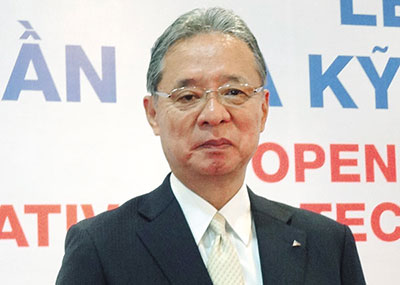Raito-FECON lays ground for Vietnam’s next building boom
 |
Vietnam has become a big magnet for Japanese investors. Why is this?
Over the past years, Vietnam’s growth rate has been quite high and stable, at an annual average of 6-8 per cent, and I believe it will continue on this pace for the time to come. Raito has pinned its hopes on Vietnam’s growth, and has seen that the country is ideal for our investment.
The key drivers of the growth include the diligence and good skills of the Vietnamese people. Furthermore, the country’s stable political and social climate is quite favourable for investors. So I think Vietnam can attract more foreign direct investment, especially Japanese investment.
What is your assessment about the potential of the construction market in general, and the field of soft soil improvement for urban underground construction and metro line systems in particular?
To reach higher growth, Vietnam should speed up the construction of infrastructure to drive manufacturing sectors forward. With the country’s rising population and urbanisation, I think Vietnam’s demand for construction will greatly increase in the time to come.
Like the Japanese cities of Tokyo and Osaka, in Hanoi and Ho Chi Minh City almost all buildings and infrastructural works are constructed on soft soil. This will offer big opportunities to Raito to participate in infrastructure projects in Vietnam.
During its 70-year history, Raito has conducted extensive research and developed its technologies for improvement of soft soil and foundation construction. I think these technologies will be quite helpful for the construction of underground railway infrastructure and underground waterworks in Vietnam’s urban areas.
In the future, Vietnam’s demand for solutions to treat soft soil, such as chemical spraying technology and mortar ejection technology, will greatly increase, as the solutions will help build infrastructure works more quickly and safely.
What distinguishes Raito’s strengths with those of rivals in Vietnam? What advanced technologies will Raito promote here?
Raito’s strong points are shown in its great experience and capacity in deploying many kinds of solutions over the past 70 years in Japan. We have many solutions, technologies, and specialised materials used for different purposes in construction, for different soil and geological conditions. We have also conducted research and developed solutions and technologies through it. This has made Raito quite different in the market.
Like Japan, Vietnam has many locations with soft soil, which need different treatment technologies. So I think our technologies are quite suitable to Vietnam’s different geological conditions.
We are planning to bring to Vietnam our chemical spraying technology – in which we use a substance to condense the surface of concrete – our large-diametre cement stake drilling technology, and other foundation improvement technologies as well. This will depend on the market’s demand.
Why did Raito select FECON to co-operate with?
We have worked with many companies in Vietnam, but finally selected FECON to establish this joint venture company. It is because FECON’s vision and strategy are close to ours. It has taken nearly four years for Raito and FECON to set up this venture. During this period, the two firms have co-operated in implementing projects and finding the best ways to work together. This has been sound groundwork for the two sides to operate the Raito-FECON Advanced Geotechnical Joint Stock Company (RFI).
RFI has chartered capital of $1.4 million, with Raito holding a 51 per cent stake, and FECON (including FECON JSC and FECON Foundation Engineering and Underground Construction JSC) with a 49 per cent stake.
Why has Raito chosen this time to establish RFI?
Though we knew that the Vietnamese demand for solutions like ours was greatly increasing, we didn’t want to hurriedly establish RFI. Instead we thought that the most important thing we could do is to have a full understanding of our partner, so that the joint venture could work well. So we took the time to co-operate in deploying projects before deciding to establish RFI now.
With the support of technology from Raito, could RFI become a pioneer in Vietnam? What will RFI do in the time to come?
RFI will first engage in works with large-diametre cement stake drilling technology. We will also apply other technologies in urban areas, such as our chemical spraying technology – with a substance used to condense the surface of concrete – and a technology for improving foundations.
We will also introduce solutions for slope protection for roads and waterways in mountainous and hilly areas.
What the stars mean:
★ Poor ★ ★ Promising ★★★ Good ★★★★ Very good ★★★★★ Exceptional
Latest News
More News
- The generics industry: unlocking new growth drivers (February 04, 2026 | 17:39)
- Vietnam ready to increase purchases of US goods (February 04, 2026 | 15:55)
- Steel industry faces challenges in 2026 (February 03, 2026 | 17:20)
- State corporations poised to drive 2026 growth (February 03, 2026 | 13:58)
- Why high-tech talent will define Vietnam’s growth (February 02, 2026 | 10:47)
- FMCG resilience amid varying storms (February 02, 2026 | 10:00)
- Customs reforms strengthen business confidence, support trade growth (February 01, 2026 | 08:20)
- Vietnam and US to launch sixth trade negotiation round (January 30, 2026 | 15:19)
- Digital publishing emerges as key growth driver in Vietnam (January 30, 2026 | 10:59)
- EVN signs key contract for Tri An hydropower expansion (January 30, 2026 | 10:57)
















 Mobile Version
Mobile Version